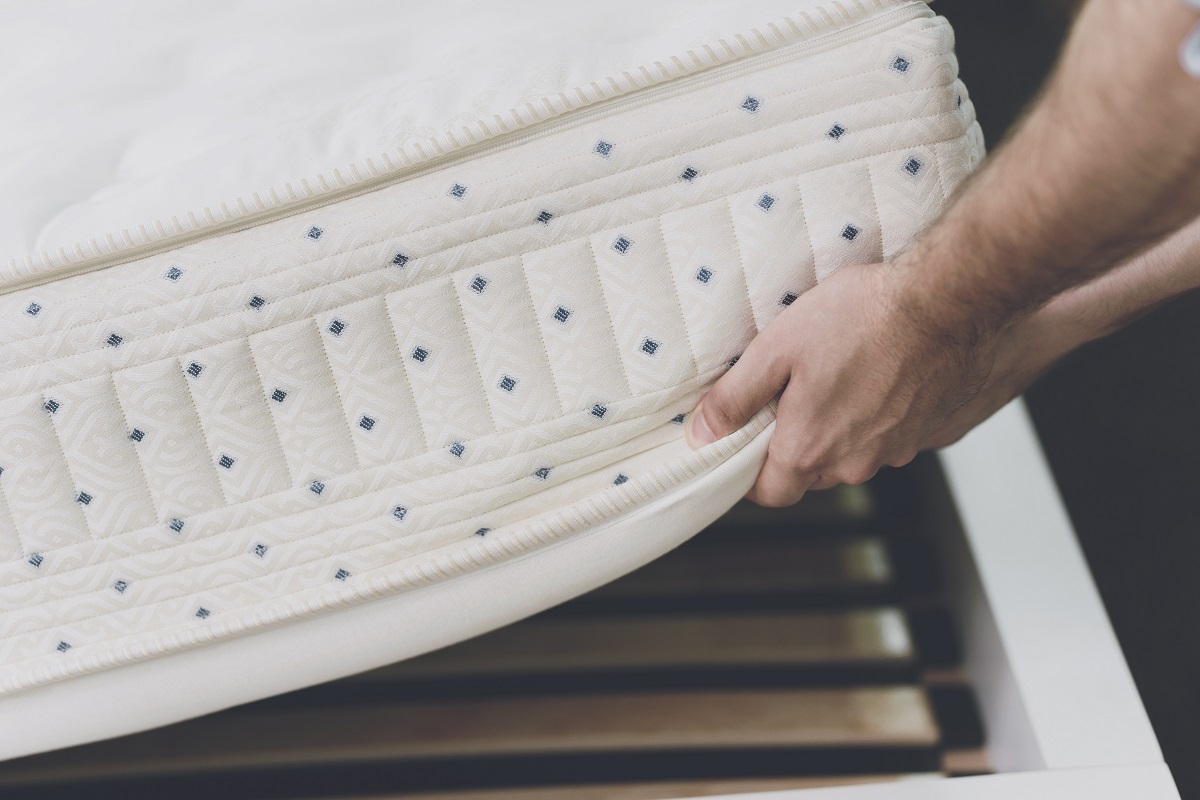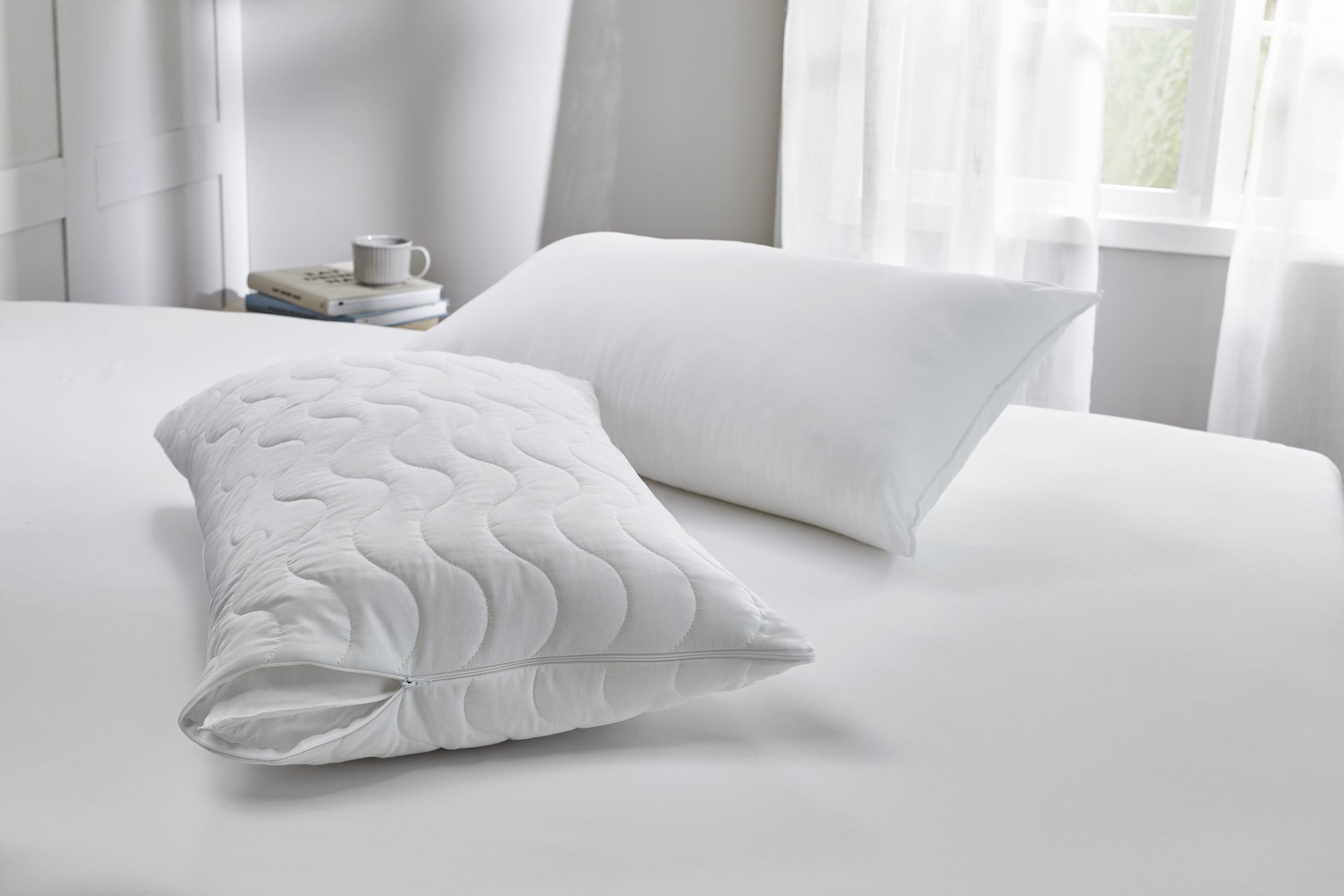Home>Interior Design>What Is The Best Mattress Firmness? Advice From Experts


Interior Design
What Is The Best Mattress Firmness? Advice From Experts
Modified: March 26, 2024
Looking for the best mattress firmness? Get expert advice from interior design professionals to choose the perfect level of comfort for your sleep.
(Many of the links in this article redirect to a specific reviewed product. Your purchase of these products through affiliate links helps to generate commission for Storables.com, at no extra cost. Learn more)
Introduction
Choosing the right mattress is a crucial decision for ensuring a good night’s sleep and overall well-being. One of the key factors to consider when selecting a mattress is the firmness level. Mattress firmness refers to the level of support and comfort provided by a mattress.
Understanding mattress firmness is essential as it can greatly affect the quality of your sleep. The ideal level of firmness varies based on individual preferences, sleeping position, and even certain health conditions. By considering these factors, you can select a mattress that provides optimal support and promotes a restful sleep.
In this article, we will explore the concept of mattress firmness, factors to consider when choosing the firmness level, and the best firmness options for different sleeping positions and health conditions. We will also delve into the importance of personal preferences and comfort in selecting the right mattress.
By the end, you will be equipped with the knowledge and expert advice necessary to make an informed decision about the best mattress firmness for your specific needs.
Key Takeaways:
- Choosing the right mattress firmness is crucial for a good night’s sleep. Consider factors like body weight, sleeping position, and health conditions to find the perfect balance of support and comfort.
- Personal preferences and comfort play a significant role in selecting the best mattress firmness. Prioritize your own needs and try out different firmness levels to ensure a satisfying sleep experience.
Understanding Mattress Firmness
Mattress firmness refers to the level of support provided by a mattress. It is determined by the materials and construction of the mattress, as well as the density of the support layers. Understanding various aspects of mattress firmness can help you determine the right level of support for your needs.
Firmness levels typically range from soft to medium to firm. Soft mattresses offer a plush, sinking-in feeling and are ideal for individuals who prefer a gentle and contouring sensation. Medium firmness offers a balance of support and comfort, providing adequate support while still allowing some sinkage. Firm mattresses, on the other hand, offer strong support and minimal sinkage, making them suitable for those who prefer a more solid sleeping surface.
It’s important to note that mattress firmness is subjective and can vary among different brands and models. A medium firmness level from one brand may feel different from a medium firmness level from another brand. To accurately assess firmness, consider factors such as your body weight, sleeping position, and personal preferences.
It’s worth mentioning that firmness is not the same as support. A firm mattress doesn’t necessarily mean it provides better support. Support refers to the ability of the mattress to keep your spine aligned and maintain proper body posture during sleep. Even a soft mattress can offer excellent support if it contours to your body and maintains proper spinal alignment.
When choosing a mattress, it’s important to find the right balance between comfort and support. A mattress that is too soft may lack support and lead to back pain and discomfort, while a mattress that is too firm may cause pressure points and hinder proper blood flow.
Now that we have a better understanding of the concept of mattress firmness, let’s explore the factors to consider when selecting the level of firmness that suits you best.
Factors to Consider when Choosing Mattress Firmness
Choosing the right mattress firmness involves considering several crucial factors. By taking these factors into account, you can ensure that the mattress you select provides the ideal balance of comfort and support for a restful night’s sleep.
Body Weight
Body weight plays a significant role in determining the appropriate firmness level. People with a lighter body weight may find a softer mattress more comfortable, as it allows for better contouring and pressure relief. On the other hand, individuals with a heavier body weight may require a firmer mattress to provide adequate support and prevent sinking too much into the mattress.
Sleeping Position
Your preferred sleeping position is another important consideration when choosing mattress firmness. Different sleeping positions require different levels of support to maintain proper spinal alignment.
- Side sleepers: Side sleepers generally benefit from a slightly softer mattress that cushions the hips and shoulders, allowing the spine to stay aligned.
- Back sleepers: Back sleepers typically need a medium to firm mattress to provide proper support to maintain the natural curvature of the spine.
- Stomach sleepers: Stomach sleepers usually require a firmer mattress to prevent the hips from sinking too much, which can lead to discomfort and strain on the spine.
Read more: What Is The Best Firm Mattress
Health Conditions
If you have specific health conditions such as chronic back pain or arthritis, choosing the right firmness level becomes even more important. Individuals with back pain may benefit from a medium-firm mattress that offers sufficient support to alleviate discomfort while still providing some cushioning. Those with arthritis or joint pain may find a softer mattress more comfortable as it can relieve pressure on sensitive areas.
Partner Considerations
If you share your bed with a partner, their preferences and needs should also be taken into account. Communication and compromise are essential to find a mattress firmness that suits both individuals. Look for mattresses that offer customizable firmness levels or those specifically designed with motion isolation to minimize disturbances from your partner’s movements during sleep.
Personal Preferences
Ultimately, personal preferences should be a significant factor in choosing mattress firmness. Consider what feels most comfortable for you and aligns with your sleep preferences. If possible, try out different firmness levels in-store or look for brands that offer generous return policies or trial periods. This will allow you to test the mattress in the comfort of your own home and ensure it meets your expectations.
By considering these factors, you can make a more informed decision when it comes to selecting the right mattress firmness for your needs. Now, let’s explore the different mattress firmness levels and their characteristics.
Different Mattress Firmness Levels
Mattresses come in various firmness levels, each offering a unique feel and level of support. Understanding the characteristics of different firmness levels can help you choose the one that aligns with your comfort preferences.
Soft
A soft mattress has a plush and luxurious feel, providing excellent contouring and sinkage. It offers gentle support and is ideal for individuals who prefer a cloud-like and enveloping sensation. Soft mattresses are known for relieving pressure points and are suitable for side sleepers or those who enjoy a more cushioned sleeping experience. However, it’s important to note that a soft mattress may lack adequate support for individuals with heavier body weight or those who require more spinal alignment.
Medium
A medium-firm mattress strikes a balance between support and comfort. It provides a combination of cushioning and support, making it a popular choice for various sleepers. The medium firmness level offers enough contouring to relieve pressure points, while still providing sufficient support to maintain proper spinal alignment. It’s suitable for back sleepers, combination sleepers, and individuals who prefer a versatile level of firmness. Most people find medium firmness to be comfortable and supportive, regardless of their sleeping position or body weight.
Firm
A firm mattress offers a solid and supportive feel, limiting sinkage and providing a more stable sleeping surface. It has less give and offers a higher level of resistance against your body weight. Firm mattresses are suitable for stomach sleepers, as they prevent excessive sinking of the hips and keep the spine aligned. They also work well for individuals with heavier body weight who require extra support. However, it’s important to note that a firm mattress may feel too rigid and uncomfortable for those who prefer a softer and more cushioning sensation.
It’s worth mentioning that mattress firmness can be subjective, and what feels firm to one person may feel soft to another. Additionally, different mattress brands may have slight variations in their firmness levels. Consulting customer reviews and trying out mattresses in person can provide a better understanding of how different brands interpret firmness.
Now that you have a better understanding of the various firmness levels, let’s explore the best mattress firmness for different sleeping positions.
Best Mattress Firmness for Different Sleeping Positions
The ideal mattress firmness varies based on your preferred sleeping position. Different positions require different levels of support to keep your spine properly aligned and promote a comfortable night’s sleep. Let’s explore the best mattress firmness for each sleeping position:
Read more: How To Sleep On A Firm Mattress
Side Sleepers
Side sleepers generally benefit from a slightly softer mattress that provides good pressure relief and allows for proper alignment of the spine. A medium-soft to medium-firm mattress is typically recommended for side sleepers. This level of firmness helps cushion the shoulders and hips, preventing the formation of pressure points and maintaining proper spinal alignment. Look for mattresses that offer adequate contouring to accommodate the natural curves of your body.
Back Sleepers
Back sleepers typically require a medium to medium-firm mattress that offers enough support to maintain the natural curvature of the spine. A mattress that is too soft may cause the lower back to sink too much, leading to discomfort and potential alignment issues. On the other hand, a mattress that is too firm may not provide enough contouring to support the curves of the body. Look for a mattress that strikes a balance between support and comfort to promote a healthy sleeping posture for back sleepers.
Stomach Sleepers
Stomach sleepers generally need a firmer mattress to prevent excessive sinking of the hips, which can lead to strain on the lower back and neck. A medium-firm to firm mattress is typically recommended for stomach sleepers as it provides the necessary support to keep the spine aligned. Avoid overly soft mattresses that may cause the hips to sink too much, which can lead to discomfort and improper alignment. A firmer surface helps to distribute body weight more evenly, reducing the likelihood of discomfort in the stomach and lower back areas.
Combination Sleepers
Combination sleepers who frequently change positions during the night may benefit from a medium-firm mattress. This level of firmness provides a balance between support and cushioning, allowing for easy movement and maintaining proper spinal alignment in various sleeping positions. Look for mattresses that offer good responsiveness, as they can adapt to your changing positions and provide consistent comfort.
Remember, these recommendations are general guidelines, and individual preferences may vary. It’s important to listen to your body and choose a mattress firmness that feels comfortable and supportive for your specific needs and sleeping habits.
Next, let’s explore the best mattress firmness for specific health conditions.
Best Mattress Firmness for Specific Health Conditions
The right mattress firmness can be especially important for individuals with specific health conditions. Choosing the correct level of support can help alleviate pain, reduce discomfort, and improve sleep quality. Here are the recommended mattress firmness levels for some common health conditions:
Back Pain
If you suffer from chronic back pain, finding the right mattress firmness is crucial for proper support and pain relief. In general, a medium-firm mattress is often recommended for individuals with back pain. This level of firmness offers a balance between comfort and support, providing enough cushioning to relieve pressure points, while keeping the spine aligned. However, it’s important to note that individual preferences may vary, and some people may find a softer or firmer mattress more comfortable based on their specific condition and needs.
Arthritis
For individuals with arthritis or joint pain, a slightly softer mattress is often preferred. A soft to medium mattress can help alleviate pressure on sensitive areas, reducing pain and discomfort. It provides cushioning and allows for gentle contouring, promoting better circulation and reducing the risk of additional pain. However, it’s important to consult with your healthcare provider to ensure that the mattress firmness aligns with your specific condition.
Fibromyalgia
People with fibromyalgia often experience widespread musculoskeletal pain and sensitivity. A medium-firm mattress is generally recommended for fibromyalgia sufferers. This level of firmness provides a good balance between support and pressure relief, offering optimal comfort for improved sleep quality. It helps distribute body weight evenly, reducing pressure points and minimizing discomfort.
Read more: Where Is The Nearest Mattress Firm
Scoliosis
For individuals with scoliosis, a condition characterized by an abnormal curvature of the spine, it’s crucial to choose a mattress that provides proper support and alignment. A medium to medium-firm mattress is often recommended, as it offers enough support to maintain the natural curve of the spine while providing some cushioning. The mattress should contour to the body, particularly in the areas that require additional support due to the spinal curvature.
It’s important to note that these recommendations are general guidelines, and individual preferences and the severity of the condition may vary. For individuals with specific health conditions, it’s advisable to consult with a healthcare professional or physical therapist to determine the most suitable mattress firmness for their needs.
Lastly, let’s explore the role of personal preferences and comfort when selecting the right mattress firmness.
Personal Preferences and Comfort
While considering factors such as body weight, sleeping positions, and health conditions is important when choosing mattress firmness, personal preferences and comfort should not be overlooked. Ultimately, you are the one who will be sleeping on the mattress, so it’s crucial to prioritize your comfort and individual needs.
Personal preferences can vary widely when it comes to mattress firmness. Some individuals prefer the sinking sensation and plushness of a soft mattress, while others find comfort in the support and stability of a firm mattress. It’s important to choose a firmness level that aligns with your personal preferences and provides a comfortable sleep experience throughout the night.
Consider how different firmness levels feel to you personally. Do you prefer a mattress that contours closely to your body or one that offers a more solid feel? Are you looking for a balance between support and cushioning or leaning more towards one end of the spectrum?
If possible, visit mattress showrooms or try out mattresses with various firmness levels to determine what feels most comfortable for you. Spending a few minutes lying on a mattress can give you a better sense of its firmness and whether it suits your preferences.
Additionally, consider other comfort-enhancing features such as mattress materials and technologies. Memory foam mattresses, for example, offer excellent contouring and pressure relief, while hybrid mattresses provide a combination of foam layers and innerspring coils for enhanced support and responsiveness.
Keep in mind that personal preferences can change over time, so it’s important to choose a mattress that allows for some level of customization or one that is backed by a generous return or exchange policy. This way, you can rest assured knowing that if your preferences change, you have the option to adjust your mattress firmness accordingly.
Ultimately, the best mattress firmness is the one that feels comfortable and supportive for your body. By considering your personal preferences and prioritizing your comfort, you can make a well-informed decision when selecting the right mattress for a restful night’s sleep.
To wrap up, mattress firmness is a crucial factor to consider when choosing a mattress. Understanding the different firmness levels, considering factors such as body weight and sleeping position, and taking into account specific health conditions can help you determine the best firmness level for your needs. It’s also important to prioritize your personal preferences and comfort to ensure a comfortable and satisfying sleep experience.
By taking these factors into consideration and being mindful of your own needs and preferences, you can select a mattress with the perfect firmness level to support your sleep and overall well-being.
Conclusion
Choosing the right mattress firmness is essential for a good night’s sleep and overall comfort. By considering factors such as body weight, sleeping position, and specific health conditions, you can determine the optimal level of support and cushioning that suits your individual needs. Additionally, taking your personal preferences and comfort into account ensures that you select a mattress that provides a truly satisfying sleep experience.
Remember that mattress firmness is subjective and can vary among different individuals. What feels comfortable for one person may not be ideal for another. That’s why it’s crucial to try out mattresses in person, explore different firmness levels, and consider factors such as materials and technologies to find the perfect fit for your preferences.
Whether you prefer the plushness and sinking sensation of a soft mattress, the balanced support of a medium-firm mattress, or the solid stability of a firm mattress, there is a perfect firmness level out there for you. Don’t be afraid to consult with healthcare professionals or take advantage of trial periods offered by mattress brands to ensure that your chosen mattress meets your expectations.
At the end of the day, your comfort and sleep quality are paramount. Investing in a mattress with the right level of firmness can contribute to better overall well-being, improved spinal alignment, and a refreshing night’s sleep. Take the time to research, consider your unique needs, and trust your instincts when making the final decision.
With the knowledge and guidance provided in this article, you are well-equipped to navigate the world of mattress firmness and choose the perfect mattress that supports your sleep needs and ensures a restful journey to dreamland each night.
Frequently Asked Questions about What Is The Best Mattress Firmness? Advice From Experts
Was this page helpful?
At Storables.com, we guarantee accurate and reliable information. Our content, validated by Expert Board Contributors, is crafted following stringent Editorial Policies. We're committed to providing you with well-researched, expert-backed insights for all your informational needs.











0 thoughts on “What Is The Best Mattress Firmness? Advice From Experts”